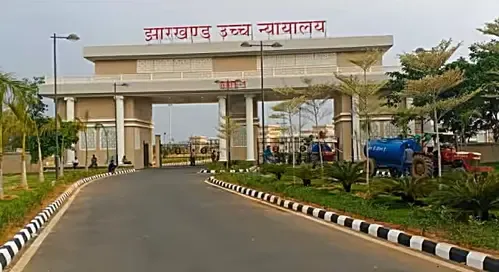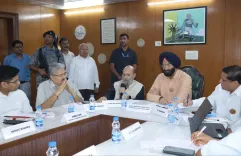Has the Jharkhand HC Ordered the State to Accelerate Land Survey with Modern Technology?

Synopsis
Key Takeaways
- The High Court emphasizes the need for modern technology in land surveys.
- Outdated land records pose challenges for farmers and increase disputes.
- The last major survey was conducted in 1932.
- The state government is actively exploring advanced methods from other states.
- The next court hearing is on September 16.
Ranchi, June 17 (NationPress) The Jharkhand High Court has mandated the state government to hasten the land survey process by utilizing modern technology, raising concerns over the prolonged delay in updating land records within the state.
A division bench consisting of Chief Justice M.S. Ramachandra Rao and Justice Rajesh Shankar issued this directive on Tuesday while addressing a Public Interest Litigation (PIL) submitted by Gokul Chand, which calls for a thorough land survey and the updating of land records in Jharkhand.
The court requested information regarding the state's progress in implementing advanced technology for the survey procedure.
In response, the state government reported to the bench that it is actively sending three teams to Bihar, Andhra Pradesh, and Karnataka to learn about the sophisticated land survey techniques utilized in those regions.
Furthermore, one team had participated in a recent conference on land survey technologies conducted in Andhra Pradesh. According to the acquired knowledge, the state intends to adopt a technology-driven strategy to expedite the land survey operations, as stated by officials.
Recognizing the state's initiatives, the bench emphasized the importance of urgency and instructed the government to accelerate the application of modern techniques. The next hearing is scheduled for September 16, by which the government is expected to provide an update on the advancements made.
The PIL indicates that the last comprehensive land survey in Jharkhand occurred in 1932, and although efforts resumed in 1975, the work remains incomplete even after several decades.
The petition underscores that outdated land records are creating substantial challenges for farmers and contributing to an increase in land disputes.
During a previous hearing, the state government informed the court that survey work has been finalized in two districts—Latehar and Lohardaga. However, the process is hindered by a lack of skilled personnel, especially in the Amin positions, many of which are still vacant.
Taking serious note of this staffing deficit, the court had previously ordered the Principal Secretary of the Department of Land Revenue and Reforms to submit an affidavit outlining when the vacant positions, including those of Amins, will be filled and when the outdated survey technology will be modernized.






